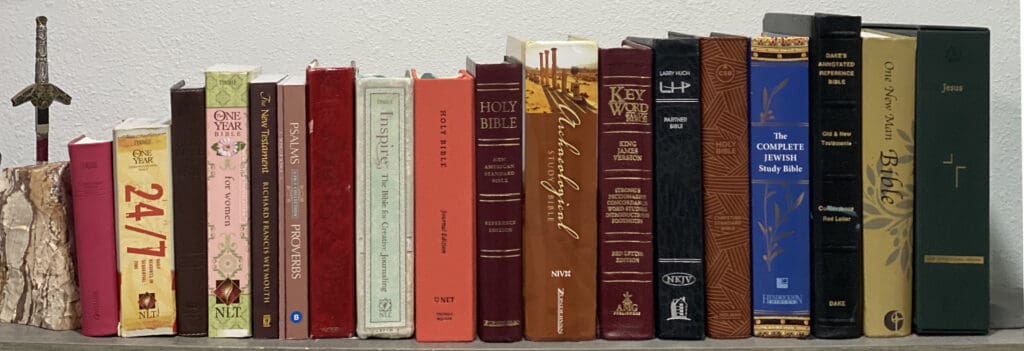
My second, third, and fourth Bible readthroughs were in the New Living Translation (NLT) Chronological Bible. A chronological Bible differs from a traditional one in that, instead of following the standard book order, it arranges events in the order in which they occurred—or as closely as theologians can determine.
This particular combination of translation and timeline was a revelation to me. Though my second readthrough took a year, the third took three months, and the fourth only six weeks. I was like a child who had just discovered the joy of real food; I couldn’t get enough.
The New Living Translation spoke to me in a way I understood and, to this day, it remains my favorite for everyday reading. However, where my suddenly open eyes were concerned, chronology was key.
The Bible is often referred to as the greatest story ever told. I hesitate to use the word “story” because many associate it with fiction, but the idea of a grand narrative fits in this case.
This collection of 66 books is packed with the most awe-inspiring and life-changing accounts ever recorded. When rearranged into historical order, your experience with the text shifts. Rather than reading 66 individual books, you engage with one epic account, where each event leads into the next. Your eyes widen as you make connections you had never imagined. For example, by the time I reached the end of Leviticus in my 90-day readthrough, I understood its purpose like never before.
Leviticus was the book where I had previously stumbled in my attempts to read the Bible from Genesis to Revelation. Now, I grasped the necessity of its detailed laws and instructions. The Israelites, though enslaved for hundreds of years, were destined to become a mighty nation. Leviticus served as their crash course in how to function as a healthy, well-governed people. Of course, there is much more to Leviticus, and I have come to genuinely love it, but at that point, I was simply grateful to understand at least one reason why it was included in the Bible.

The Bible is available in chronological order in several translations. The one pictured here was actually my ninth readthrough Bible, structured with selections that, if read without stopping to study, would take about 15 minutes a day. Regardless of the translation, this remains true—you can read through the Bible in a year by consistently committing even that small amount of time.
Now that we’ve covered chronology, let’s talk about translation. The New Living Translation is a thought-for-thought or dynamic equivalence translation. This means it focuses on conveying the meaning behind sentences and paragraphs rather than adhering strictly to a word-for-word approach. By allowing the original thought to guide the translation, the NLT stays true to scripture’s meaning while making it more accessible to contemporary readers. Idioms and cultural expressions that were clear to the original audience are rendered in ways we can better appreciate today.
Here’s an example of the difference between the King James Version (KJV) and the NLT:
Proverbs 26:18-19
KJV:
As a mad man who casteth firebrands, arrows, and death, So is the man that deceiveth his neighbour, and saith, Am not I in sport?
NLT:
Just as damaging as a madman shooting a deadly weapon is someone who lies to a friend and then says, “I was only joking.”
I had growing boys when I first read this verse in the NLT, and the words hit me hard. How many times had I heard my sons do exactly this—lie to one another and then try to smooth it over by saying, “I was only joking”? I had never seen these verses in such a light before, nor realized how dangerous and damaging such lies could be. The phrases “deadly weapon” and “only joking” resonated deeply, slipping into my heart in a new way and affecting my parenting.
And isn’t that what the Bible is meant to do? It changes us and how we interact with those around us. If it doesn’t, we’re missing something and I try hard to avoid that mistake. When reading the Bible, I strive to remain open to anything the Holy Spirit wants me to see and to be quick to put it into practice in my life.
Until next time, I’m still…
Celebrating Jesus!
Tammy C